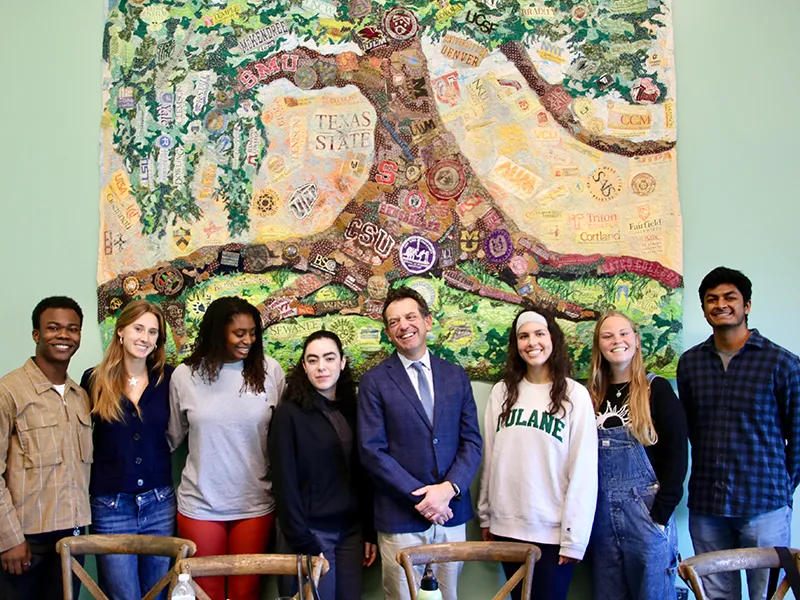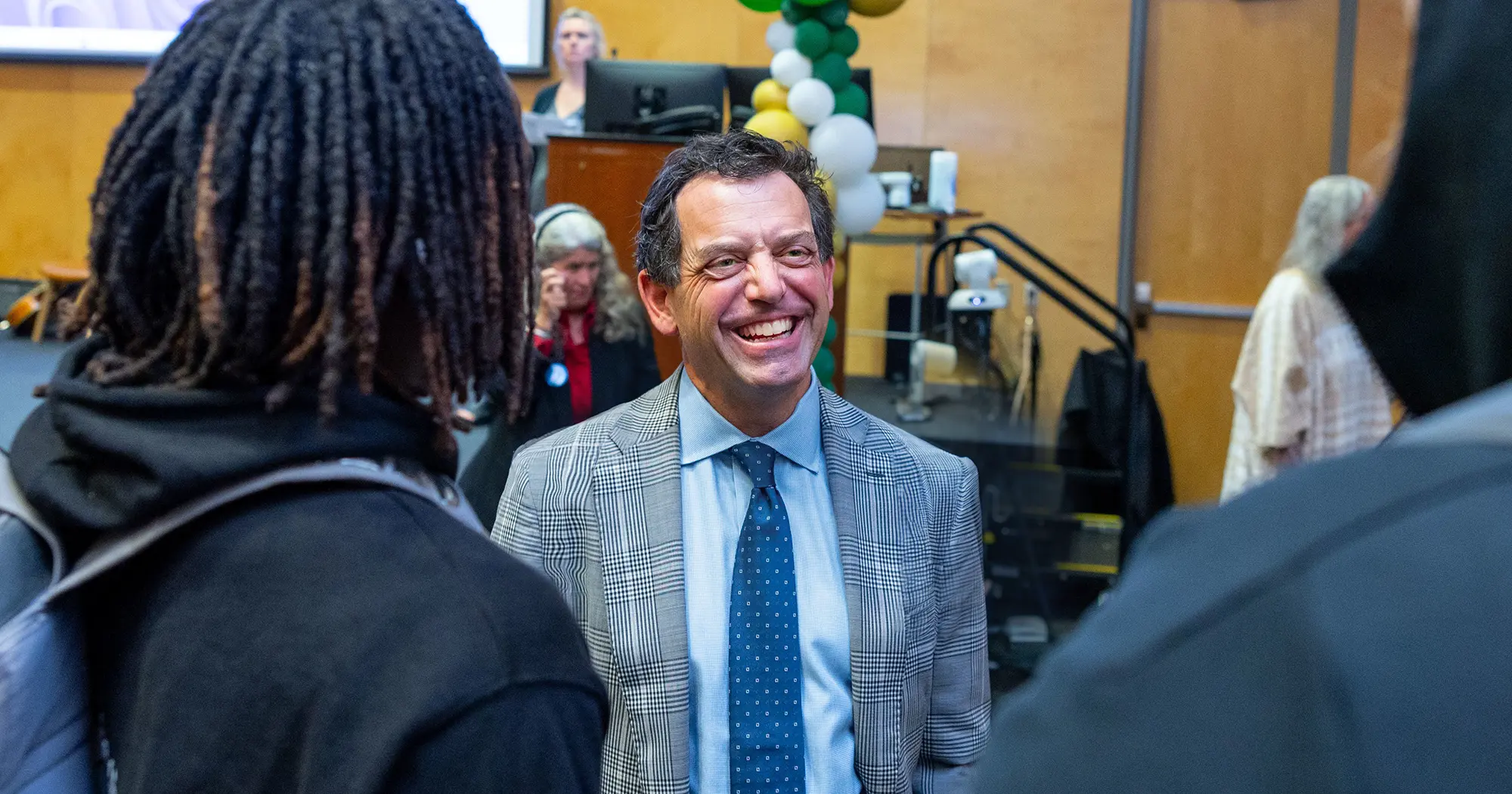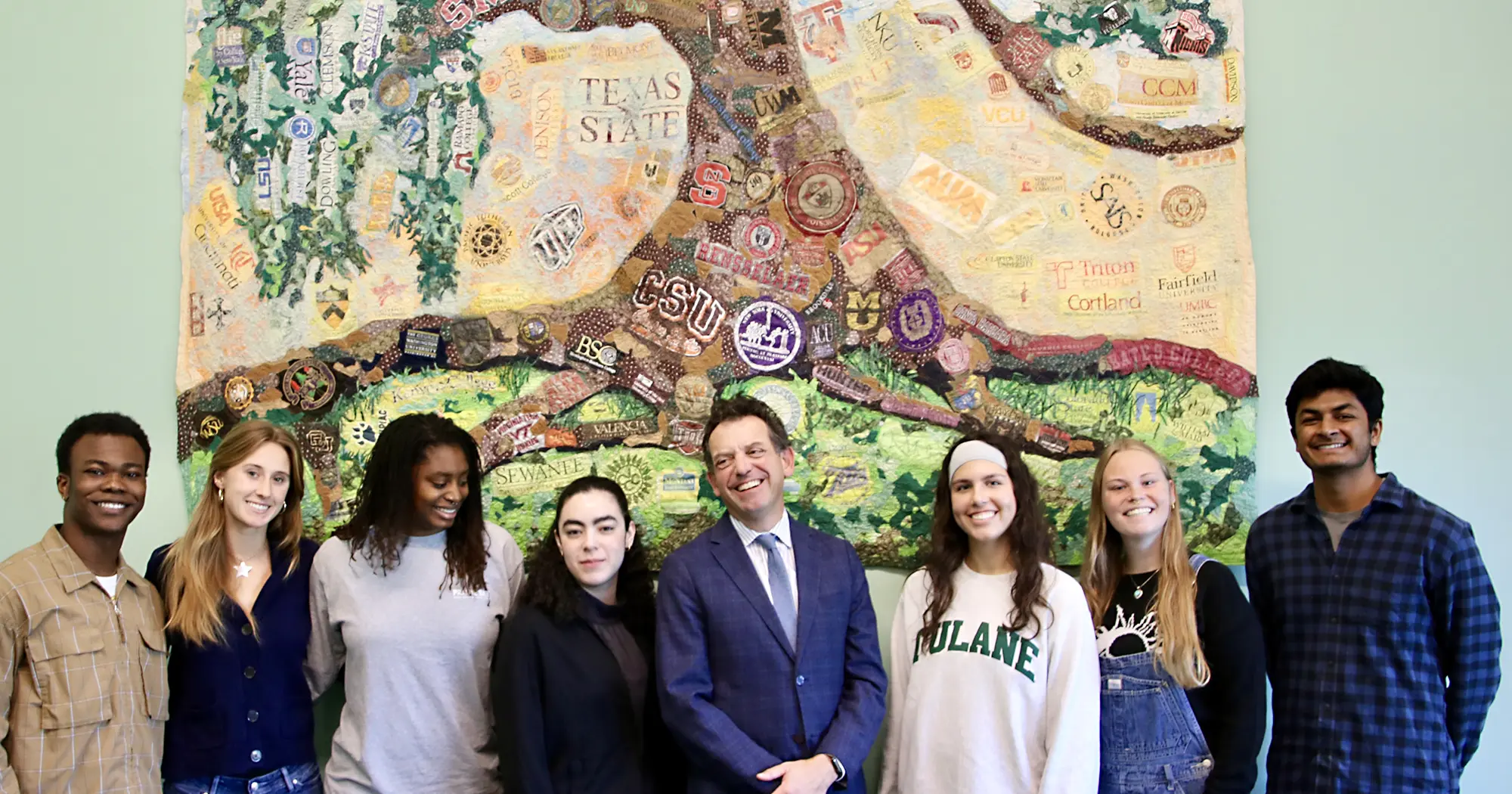

Originally published in the 2024 issue of the School of Liberal Arts Magazine
Impact is a key word in thinking about the work we do, both in the university setting and in the world beyond it. Educators are certainly not alone in wanting our work to matter. Nonprofits and community organizations want to make a difference. Charities, corporations, and individual philanthropists want to see their generosity have a positive effect. Policymakers hope to alter the trajectory toward better results. Journalists and writers want to be read for a purpose: to open a mind, broaden a discussion, provide a new viewpoint. We are all pursuing impact.
What the term means is a matter of some discussion, as is how we measure it. I’m going to argue that impact is a crucial rubric for thinking about the liberal arts — and that we should broaden how we conceive of it. Indeed, how we should recognize impact is being debated in some disciplines, as scholars open the possibility of new ways of measuring the effects of scholarship and teaching, in turn reexamining what we do and why.
In authoring contributions to previous issues of this magazine, I have tried to identify key attributes of a liberal arts education. Stepping back from the content and specific methodologies of the disciplines, I’ve highlighted skills such as critical thinking, creative problem solving, high-level communication, and the embrace of complexity to identify what a deep embrace of any of the liberal arts fields can offer.
But how do we know when our approaches are working? Where should we look for impact, how should we measure it, and when should we reframe how we define it?
“Impact,” of course, emerges from physics. When two bodies come into contact, the force of their collision resonates through both. When a bat hits a baseball, or a hammer hits a nail, it is not only the ball or the nail that moves — the bat and the hammer too absorb force. Sir Isaac Newton, the most influential of early physicists, proposed a law of impact after observing what happened when objects moving toward each other collide. Manufacturers of airbags and seat belts, bumpers and car chassis, have developed many such safety devices along these principles. The word has taken on a much larger set of meanings, but it’s helpful to hold onto the basic lesson from physics: impact moves both parties. How does this translate?
Tulane recently completed an economic impact report that showed the university had a $5.2 billion impact on the economy of Louisiana, which included a $2.3 billion economic impact on New Orleans. Creation of jobs and tax revenues are key factors in such numbers, as well as building projects, spending by students, parents, fans, and visitors, and new initiatives that expand the local and state economy.
Yet if Tulane has a massive economic impact on New Orleans, there’s no question that New Orleans has a major and complex impact on Tulane. The Newtonian principle at work! In the School of Liberal Arts, one of our strategic pillars is an embrace of our profound relationship to New Orleans and the Gulf South region. You can see that reflected in so many places, including our new and expanding Black American Music curriculum, our Creative Industries track in SLAM, the approach of our Jewish Studies Department with its focus on the American Jewish experience, and our interdisciplinary approach to environmental studies, as highlighted in Nathaniel Rich’s article in this issue.
If we move beyond economic impact, we start opening up the two-way social aspects of the question. Tulane’s undergraduate curriculum in service learning — an extraordinary range of courses in which students apply critical thinking skills to address community needs — suggests how students are as impacted by their work as are our community partners. Impact is about changing a conversation as much as it is about starting one, or shifting the focus of a field of study in a new direction. The most impactful theories and discoveries create the conditions for what can be called a paradigm shift.
In our last issue we explored new directions in the liberal arts — our “What’s Next” issue — showing how some of the oldest fields are still moving and shifting. During 2022 and 2023, I interviewed leading Black scholars who examined the history of their respective fields to shift work they — and the next generation of scholars — might do in these same subjects. (We released these conversations as a podcast called Anti-Racism and the Disciplines.) Such scholars are pushing against prevailing paradigms within their fields, even while they engage them deeply.
In his book, The Structure of Scientific Revolutions, the physicist Thomas Kuhn describes great paradigm shifts which, at first, may elude the then-presiding establishment’s ability to measure them. Kuhn highlights moments when scientific discoveries “necessitated the community’s rejection of one time-honored scientific theory in favor of another incompatible with it.” To say that the theories of scientists such as Copernicus or Newton or Einstein were revolutionary is somewhat obvious. But the point is that their work required a shifting of the very ground itself within which and upon which scientific work was being done. That’s a paradigm shift.
So how do you make sure that the way you are measuring impact is not missing such shifts? What if impact eludes the metrics we have in place? How do we know when the measures we have taken to do so need to be rethought?
I asked this question to two of our economists — a field that is known for debating how to measure change. Professor of Economics Emeritus and former president of the Southern Economic Association James Alm jokingly referred to Justice Potter Stewart’s famous line on obscenity to describe how to recognize impact: “You know it when you see it.” More seriously, Alm pointed to the range of quantitative measures economists have developed, including Research Papers in Economics (RePEc) indices, measures on Google Scholar such as the number of citations, and author-level metrics such as h-index (named after Jorge Hirsch, another physicist!) and the i10 index. In promotion and tenure cases, Alm went on, letters of recommendation, and the number and placement of publications can matter, but these can be subjective. Alm notes: “Citations are especially useful, I believe, and they have the virtue of being, well, very quantitative.”
But if Tulane has a massive economic impact on New Orleans, there’s no question that New Orleans has a major and complex impact on Tulane.
I also spoke with our Associate Professor of Economics Patrick Button, who also serves as executive director of Tulane’s new Connolly Alexander Institute for Data Science (CAIDS). Button’s own research on discrimination in employment has been pathbreaking, with incisive studies of how workers are discriminated against based on age, disability, and gender. Button notes that many measures of scholarly impact can rely on circular logics: “A scholar’s impact is typically broader, and an important but overlooked factor is to what extent the research captures attention outside of academia. While this seems vague, it is actually much easier to quantify now.”
Whether or not we have all the metrics in place to quantify impactful scholarship, what’s clear is that immediate “relevance” or short-term impact is not the best place to be looking for that work which will be truly conversation changing or even paradigm shifting. This is a key principle for schools that continually make long-term investments in faculty research to remember. Not all of those “investments” will have the same return, but recognizing that the trajectory and measure of their impact may elude us in the short run is crucial.
By focusing this issue on “Impact,” we’re signaling that it’s a good way to think about the work we do and the teaching we are proud of. So, let’s open this up like a telescope — or perhaps like a kaleidoscope — and explore the variety of ways Tulane’s School of Liberal Arts contributes meaningful impact.

Dean Brian Edwards with members of the 2024-2025 Student Advisory Board.

